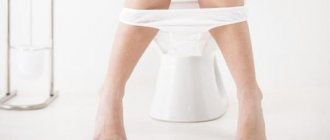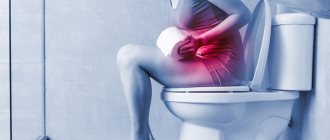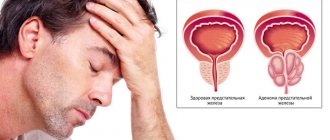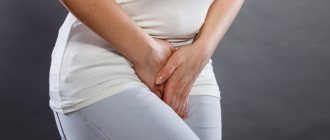Causes of painful urination in women
Women are much more likely to experience pelvic inflammation than men.
This is because the length of the urethra in a woman's body is ten times shorter than in a man's body. Thus, the number of ways infection can enter the genitourinary system increases. The bladder is one of the first to receive infection, which spreads in the body in an ascending manner. There are a number of reasons that cause painful urination in women, which does not require therapeutic treatment and is even considered an acceptable norm. Often this is mild discomfort after sexual intercourse, when the pelvic muscles spasm somewhat for a short time. During pregnancy, many women experience problems with urination. There is no need to panic in cases of natural increase in diuresis. Sometimes the frequency of urination is influenced by the following physiological factors of the relative norm:
- a sharp change in diet and eating behavior;
- sudden increase in daily fluid intake;
- eating fresh fruits and vegetables high in starch;
- large amounts of coffee and caffeinated drinks;
- spasm of blood vessels in the kidneys after exposure to low temperatures and high air humidity.
As soon as the physiological factor is eliminated, the frequency of urination approaches the usual norm.
The most likely causes of painful urination include the following diseases, conditions and circumstances:
- inflammation of the urinary tract;
- cystitis;
- pyelonephritis;
- urethritis;
- bladder tumors;
- urethral injuries;
- too tight underwear;
- exposure to frequent stressful situations;
- osteochondrosis;
- pathological menstruation;
- postoperative rehabilitation;
- urolithiasis disease.
Infections that cause inflammatory processes in the ureters, kidneys and bladder, lead to increased swelling and tissue hypertrophy. This interferes with the normal outflow of urine, which is the root cause of pain. If no action is taken, the inflamed tissue areas may even begin to bleed. Additional infection will occur in the affected areas.
Sand in the kidneys saturates the urine with salt crystals. At the time of urination, the crystals irritate the mucous membrane of the urinary tract with their rough surface, causing local irritation.
Painful periods can refer pain to the bladder or urethra. As soon as menstruation ends, the discomfort goes away on its own. Using vaginal tampons during menstruation can cause discomfort even long after the tampon is removed.
Premenstrual syndrome is a special condition in a woman’s body before menopause. On the eve of menstruation, a minor or significant change in hormonal balance occurs, depending on the individual characteristics of the body. In a matter of days, the production of hormones and biologically active substances changes, which affects the functioning of the urinary system.
Due to a sedentary lifestyle, modern women are prone to developing osteochondrosis. This disease causes pinching of the nerve endings in the spinal column at the level of the pelvic organs. Moreover, the nerve cells that regulate bladder function are also pinched. This is how painful urination begins every time you visit the toilet.
Sexually transmitted diseases cause inflammation of the reproductive system and are dangerous with a number of complications:
- chlamydia;
- genital herpesvirus;
- vulvovaginitis;
- vaginitis;
- gardnerellosis;
- syphilis;
- mycoplasmosis;
- gonorrhea;
- candidiasis;
- papillomavirus;
- cytomegalovirus;
- genital warts;
- Zika virus;
- trichomoniasis;
- ureaplasmosis.
The anatomical feature of the female vagina, located in close proximity to the urethra, promotes the mutual penetration of bacteria and viruses. The risk of E. coli penetration after defecation and evasion of personal hygiene rules should not be excluded. At risk are women who prefer anal sex.
Local irritation of the mucous membrane of the genitourinary organs can also be caused by cosmetic products. These are tools such as:
- lubricators for intimate relationships;
- personal care detergents;
- aggressive laundry detergents;
- underwear made of synthetic materials.
Intimate hygiene products that have not passed the necessary certification are replete with dyes and fragrances, which provoke local irritation of the mucous membranes and skin of the external genitalia. When purchasing such products, you should carefully study their composition and pay attention to the expiration date and labeling from the manufacturer.
Can tampons cause pain?
An unpleasant symptom occurs as a result of using tampons during menstruation.
A girl can get an infection in her vagina. That is why it is necessary to adhere to the recommendations for the use of personal hygiene products. Read also: how to insert a tampon correctly.
Tampons should be used immediately after opening the individual packaging. Hands must first be washed. An infection acquired during menstruation spreads rapidly and almost instantly provokes a painful sensation.
A possible root cause of pain when urinating is an allergy to the tampons used. In this case, you need to urgently consult a doctor.
Causes of painful urination in pregnant women
Pregnant women experience hormonal variability, which leads to changes in the functioning of the entire body. The mucous membranes are the first to react to the concentration of hormone levels in the blood. Epithelial tissues may experience:
- dryness;
- swelling;
- redness;
- itching;
- tingling;
- burning;
- increased production of mucous secretion.
Also, when the balance of hormones is disrupted, a woman’s genitourinary system becomes more vulnerable to pathogenic infections. Therefore, cystitis becomes a common occurrence in pregnant women. Stagnant urine in the bladder provokes the proliferation of pathogenic bacteria and microorganisms.
The next stage is urogenital candidiasis. Candida fungus in moderate quantities is a component of the normal microflora of the genital mucosa. Hormonal imbalance leads to rapid proliferation of Candida and colonization of the entire vaginal cavity. The infection spreads along an ascending path, covering new areas of the genitourinary system. Candidiasis manifests itself as painful sensations in the urethra and cervical canal. The increasing itching turns into a burning sensation, which becomes increasingly difficult to tolerate over time without proper therapy.
Painful urination in pregnant women can be the consequences of sexually transmitted infections before conception. Sexual relationships with infected partners, as well as untreated sexually transmitted diseases from the past, “wake up” from the remission phase and begin to worry with renewed vigor. Complications of sexually transmitted diseases may appear years later.
In women during gestation, the excretory system is actually subject to a double load, which is difficult to cope with even with healthy organs. This is how isolated urinary syndrome manifests itself in pregnant women, when protein, red blood cells and white blood cells appear in a urine test.
If conception occurs in a woman who previously suffered from chronic renal failure, then her life may be in danger of serious complications. In particular, in the early stages this can lead to miscarriage, and in the later stages - to gestosis.
During pregnancy, during urination, painful sensations may be observed at the end of urine output. During normal development of the embryo, the size of the uterus increases, over time beginning to exert strong pressure on neighboring organs. The bladder, located close to the uterus, experiences constant discomfort. In the later stages of gestation, during urination, a woman may notice a feeling of incomplete emptying of the bladder and a weakening of the pressure of the stream. Gynecologists consider such symptoms to be acceptable at the end of the third trimester.
Associated symptoms of painful urination in women
Frequent painful urge to urinate is accompanied by symptoms confirming the development of the inflammatory process:
- burning and itching in the urethra;
- deterioration of health;
- severe weakness;
- increased body temperature;
- nausea;
- headache;
- dizziness;
- feverish condition;
- sleep disturbance;
- increased blood pressure;
- profuse sweating;
- bloody discharge from the urethra;
- serous or purulent vaginal discharge;
- sexual dysfunction;
- cloudy urine.
When tumors develop in the bladder, there may be no complaints at all for a long time. Painful sensations when urinating begin to appear when the tumor reaches an impressive size. If it is localized in close proximity to the urethra or ureter, the woman experiences cutting pain when filling the bladder and a false urge to urinate even after emptying the contents. Often tumors provoke the appearance of bloody discharge along with urine.
In most cases, pain at the end of urination indicates an acute course of the pathological process. This requires immediate treatment.
What is the severity of the symptom?
Pain syndrome can vary in nature, duration and intensity. Discomfort may manifest itself as:
- burning;
- stretching;
- pain;
- feeling of incomplete emptying.
The symptom can be either isolated or accompanied by other pathological signs. Tell your doctor about any manifestations that are present.
The pain can be short-term or, on the contrary, long-lasting. Each of the probable diseases has a separate clinical picture.
Diagnosis of painful urination in women
If painful urination occurs, a woman should urgently seek advice from a gynecologist or urologist. Diagnostic measures in the genitourinary system should begin with the collection of complaints and symptoms of the patient. An important role is played by hereditary characteristics and anamnesis. Pain as urine passes through the urinary tract can be observed in the walls of the urethra, in the bladder and vagina.
On examination, redness of the external areas of the genital organs indicates an inflammatory process in the pelvic organs. A comprehensive examination is prescribed:
- General blood analysis. During inflammatory processes, the level of leukocytes increases significantly, the leukocyte formula shifts to the left, and the erythrocyte sedimentation rate (ESR) increases.
- General urine analysis. Protein or traces of protein, microhematuria, and bacteriuria are observed in morning urine. Normally, there should be no protein in the urine. The presence of protein indicates high permeability of the renal membrane, which is not an acceptable norm. The density indicator indicates the filtration capacity of the renal pelvis. Low density indicates renal failure. Rarely, this indicates excessive fluid intake. Leukocytes indicate inflammatory processes in the urinary system. Fragments of mucus and pus confirm the progression of the bacterial infection.
- Blood chemistry. The presence of infection is indicated by increased acute phase indicators.
- Bacterial culture of urine. The analysis is carried out to identify the pathogen and determine the susceptibility of pathogenic microorganisms to antibiotics.
- Bacterioscopic smear of the vaginal mucosa. A modern diagnostic method that allows you to identify the presence and number of pathogenic bacteria on the mucous membrane of the external genitalia.
- Urine analysis to determine nitrites. Indicators in the form of test strips are used to collect information.
- Fibrinogen marker. This marker confirms or denies the development of an inflammatory process in the body.
- Ultrasound examination of the pelvic organs. The ability to conduct research to obtain the most complete picture in late pregnancy is difficult.
- Cystoscopy. An endoscope is used to examine the inner surface of the bladder to identify tumor processes.
- Enzyme-linked immunosorbent assay (ELISA). Screening test to detect HIV infection.
- Urography of the urethra with biopsy. When a neoplasm develops in the urethra, the surface of the mucous membrane is studied and the resulting fragment is analyzed for the presence of mutant cells.
- Magnetic resonance imaging. A modern method of studying a diseased internal organ.
Treatment of painful urination in women
Treatment begins immediately after receiving the results of all prescribed diagnostic procedures. As the infection progresses, broad-spectrum antibiotics are used until the results of bacterial culture of urine are obtained and the susceptibility of the microflora is determined.
Since antibiotics are being taken, we must not forget about adding probiotics and symbiotics to avoid dysbiosis of the mucous membranes. Any prescriptions for pregnant women should be made with extreme caution. Some drugs are contraindicated during gestation and lactation, since lactobacilli and bifidobacteria in their composition can provoke increased fermentation and aggravate allergic reactions in the digestive system.
To reduce body temperature and acute pain, non-steroidal anti-inflammatory drugs are prescribed. As soon as the acute phase passes, physiotherapeutic procedures and vitamin therapy are added. Most physiotherapeutic procedures are contraindicated for pregnant patients.
Infectious diseases of internal organs indicate a weak immune system. Persons with weakened protective functions of the body need, in addition to the main therapy aimed at overcoming infection in the body, to take additional medications:
- immunomodulators;
- vitamin complexes;
- microelements;
- biostimulants.
Vaginal suppositories help achieve the expected result. The constituent components of vaginal suppositories relieve inflammation, inhibit pathogenic infections and increase the body's protective functions. In the pharmacy chain you can buy candles made from sea buckthorn oil, aloe extract, alfalfa, chamomile flowers, calendula flowers, and sophora.
Apply candles at night, and in the morning remove the remains with warm running water. The external genitalia are then wiped with a napkin made of natural fabric. In acute forms of the disease, suppositories are placed every four hours.
Folk remedies for treating painful urination provide good results, but only in cases where they are clearly agreed upon with the attending physician.
In case of diseases of the urinary system, it is extremely important to follow a nutritional diet. You will have to give up the following types of products:
- acute;
- smoked;
- fried;
- salty;
- sweet flour;
- fast foods;
- strong tonic drinks;
- sweet carbonated drinks.
The food consumed should be rich in plant fiber, vitamins and microelements. Dishes made from animal protein should be consumed in moderation with vegetable salads. Fermented milk products will have a beneficial effect on the functioning of the intestines, which will become indispensable for dysbiosis and taking antibiotics. Along with this, enterosorbents are drunk, which quickly remove decay products and suppressed pathogenic flora from the walls of the mucosa. This helps to avoid intoxication of the body and increased stress on the urinary system.
If urolithiasis is confirmed, you will have to be patient and follow all the doctor’s recommendations. Some types of kidney stones can be dissolved and removed from the body naturally. Also, maintaining a stable drinking regime normalizes the electrolyte balance in the body. The following drinks that can be prepared at home will be useful:
- dried fruit compotes;
- fruit jelly;
- juices from vegetables and fruits without added sugar;
- herbal teas;
- infusion of rose hips;
- vitamin fruit drinks.
An excessively frequent urge to urinate can be caused by:
- hot chocolate;
- cocoa;
- coffee;
- strong black tea;
- factory-produced juices.
The pelvic organs “love” dry heat. If possible, during the cold season, it is advisable to additionally warm up the lumbar region and wear warm clothes. Such procedures must be coordinated with a specialist.
How is diagnosis and treatment carried out?
Each situation is individual. The woman should visit a doctor. Usually girls are recommended to go through:
- Ultrasound;
- blood test;
- urine analysis;
- MRI.
After receiving the diagnostic results, treatment is recommended. Drugs are selected individually. Despite the diagnosis, all women are advised to:
- adhere to personal hygiene recommendations;
- Healthy food;
It is recommended to drink more water
- drink enough fluids;
- eliminate any chronic abnormalities;
- to refuse from bad habits;
- use contraception during sex;
- dress according to the weather;
- consult a doctor in time.
Self-selection of medications is dangerous and, at a minimum, ineffective.
Prevention of painful urination in women
Preventive measures for painful urination in women include following simple rules that will help prevent the development of diseases of the urinary system:
- Get rid of bad habits. Smoking and frequent consumption of alcoholic beverages provoke the development of tumor processes and a decrease in the body's protective functions.
- Avoid hypothermia of the pelvic organs. The female reproductive system is extremely vulnerable in the cold season. With the onset of cold weather, you need to wear warm, waterproof shoes, and if water gets in, immediately change into dry shoes.
- Avoid swimming in bodies of standing water, even in hot weather. When the condition of the water even in a clean pool causes concern, water procedures should be canceled.
- Avoid injuries to the genitourinary organs. Ruptures of the mucous membranes of the external genitalia often cause irreversible inflammatory processes that become chronic.
- Have sex only with the use of contraception and be selective in your choice of sexual partners.
- Avoid contact with harmful toxic substances at work and at home. If possible, you should use a respirator or a cotton-gauze bandage.
- Wash underwear using phosphate-free powders and without bleaching effects. Chemicals tend to linger on tissues and cause severe irritation of the mucous membranes.
- Observe personal hygiene rules daily. In hot weather and after physical activity, wash the external genitalia at least twice a day.
- If you feel the urge to urinate, do not delay emptying your bladder for subjective reasons.
- Do not reduce the daily volume of fluid consumed. For an adult, it is from two to three liters per day.
- Have preventive examinations with a gynecologist twice a year.
- Eat well and strengthen your body.
If painful sensations appear when urine leaves the body, you should urgently seek advice from a specialist. This is especially true for women during gestation. Ignoring acute symptoms and self-medication can only lead to complications of inflammatory diseases and irreversible consequences.
Attention!
This article is posted for informational purposes only and under no circumstances constitutes scientific material or medical advice and should not serve as a substitute for an in-person consultation with a professional physician.
For diagnostics, diagnosis and treatment, contact qualified doctors! Number of reads: 5063 Date of publication: 07/26/2018
Urologists - search service and appointment with urologists in Moscow
Frequent urination after menstruation
When the critical days end, all metabolic and hormonal processes are normalized. The water that has accumulated over several days begins to be removed in an enhanced manner. As a result, the frequency of visits to the toilet increases, and the volume of urine output exceeds the amount of fluid consumed. This phenomenon can last no more than two days and should not bother you at night. Any deviation should be alarming.
If frequent bowel movements are observed after scanty menstruation, the help of a gynecologist is strictly necessary. The cause may be completely harmless factors or serious disturbances in the functioning of the body. Any discomfort requires urgent seeking qualified help.











